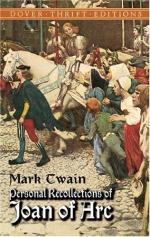Joan said, musingly, as if she were thinking aloud:
“It sounds true. If true, it were no great harm to suspend the law this one time—any would say that. It may not be true, but if it is true—” She turned suddenly to the man and said, “I would see your eyes—look up!” The eyes of the two met, and Joan said to the officer, “This man is pardoned. Give you good day; you may go.” Then she said to the man, “Did you know it was death to come back to the army?”
“Yes,” he said, “I knew it.”
“Then why did you do it?”
The man said, quite simply:
“Because it was death. She was all I had. There was nothing left to love.”
“Ah, yes, there was—France! The children of France have always their mother—they cannot be left with nothing to love. You shall live—and you shall serve France—”
“I will serve you!”
—“you shall fight for France—”
“I will fight for you!”
“You shall be France’s soldier—”
“I will be your soldier!”
—“you shall give all your heart to France—”
“I will give all my heart to you—and all my soul, if I have one—and all my strength, which is great—for I was dead and am alive again; I had nothing to live for, but now I have! You are France for me. You are my France, and I will have no other.”
Joan smiled, and was touched and pleased at the man’s grave enthusiasm—solemn enthusiasm, one may call it, for the manner of it was deeper than mere gravity—and she said:
“Well, it shall be as you will. What are you called?”
The man answered with unsmiling simplicity:
“They call me the Dwarf, but I think it is more in jest than otherwise.”
It made Joan laugh, and she said:
“It has something of that look truly! What is the office of that vast ax?”
The soldier replied with the same gravity—which must have been born to him, it sat upon him so naturally:
“It is to persuade persons to respect France.”
Joan laughed again, and said:
“Have you given many lessons?”
“Ah, indeed, yes—many.”
“The pupils behaved to suit you, afterward?”
“Yes; it made them quiet—quite pleasant and quiet.”
“I should think it would happen so. Would you like to be my man-at-arms?—orderly, sentinel, or something like that?”
“If I may!”
“Then you shall. You shall have proper armor, and shall go on teaching your art. Take one of those led horses there, and follow the staff when we move.”
That is how we came by the Dwarf; and a good fellow he was. Joan picked him out on sight, but it wasn’t a mistake; no one could be faithfuler than he was, and he was a devil and the son of a devil when he turned himself loose with his ax. He was so big that he made the Paladin look like an ordinary man. He liked to like people, therefore people liked him. He liked us boys from the start; and he liked the knights, and liked pretty much everybody he came across; but he thought more of a paring of Joan’s finger-nail than he did of all the rest of the world put together.




